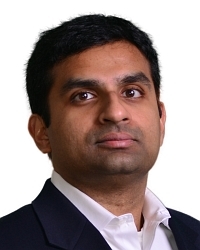| Dr Arvind Raghunathan |
| Thu 04 Jul 2019, 13:00 - 14:00 |
| Classroom 3, Sanderson Building |
If you have a question about this talk, please contact: Francisco Garcia Garcia (fgarcia2)

Embedding Perfect Structures in Process Systems
Abstract:
Many process systems applications involve discrete variables, e.g. turning generator ON/OFF; scheduling etc. Optimization of such problems are commonly referred to as Combinatorial Optimization (CO). Instances of problems in CO are significantly challenging to solve, in spite of impressive progress in the development of robust, commercial mixed integer programming solvers such as Cplex and Gurobi. The key to solving CO efficiently is to develop a tight formulation, i.e. represents the convex hull of integer feasible solutions. In this talk, we propose the idea of embedding perfect structures (convex hulls) in the formulations. In particular, we focus on applications that have a stage-state (dynamic programming) structure and show that they can be modeled using Decision Diagrams. We explain our formulation methodology through two applications in Electricity Generation (Unit commitment) and Heat Exchanger Design (HVAC). In each of these cases we show that our approach provides order of magnitude improvement over state-of the-art algorithms in the respective problem domains.
Bio:
Arvind Raghunathan is a Senior Principal Scientist at Mitsubishi Electric Research Laboratories (MERL). His research interests are in the development of algorithms for the solution of nonlinear and mixed integer programming problems with applications in electric grid operations, model predictive control, and transportation. Arvind’s research has found business impact in Mitsubishi’s products and has won top technical honors within MERL and Mitsubishi Electric Corporation. Arvind currently serves as an associate editor for Optimization & Engineering journal and as an expert of ANSI on the ISO Working Group on Smart Transportation. He obtained a Ph.D. from Carnegie Mellon University and a B.Tech from Indian Institute of Technology (Madras) both in Chemical Engineering. He worked for United Technologies Research Center for 7 years prior to joining MERL.


